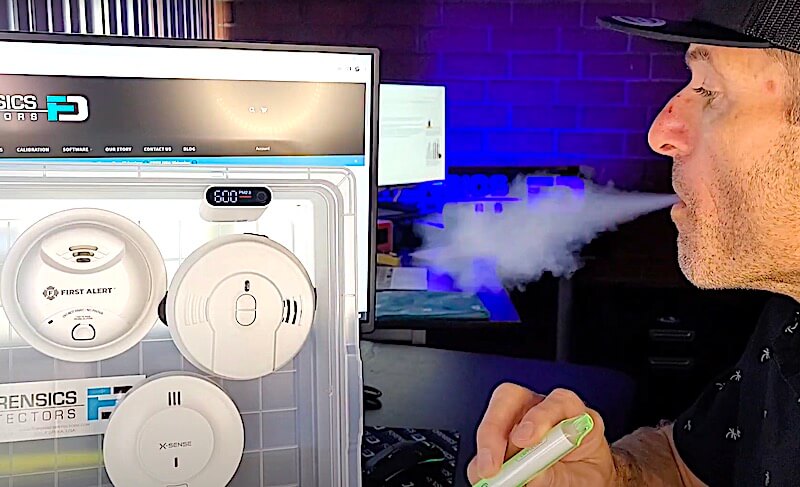Many people wonder if can weed smoke set off smoke alarms or if do smoke detectors detect weed. The truth is, while cannabis smoke might seem less potent than tobacco smoke, it can indeed trigger your smoke alarm. Understanding why this happens and how to minimize the risk is crucial for anyone who enjoys smoking weed indoors. This article will delve into the science behind smoke detectors, the combustion byproducts of cannabis, and practical tips to prevent false alarms.
This comprehensive guide will explore the mechanisms behind smoke alarms, analyze the specific byproducts produced when burning cannabis, discuss the sensitivity levels of different alarm types, and offer actionable advice on how to avoid triggering your smoke detector while enjoying your cannabis.
Does Weed Smoke Trigger Smoke Alarms?
The short answer is yes, can smoke detectors detect weed. Smoke detectors are designed to sense airborne particles, regardless of their source. When you burn cannabis, it produces combustion byproducts that float in the air as tiny particles. These particles can activate the sensor within your smoke alarm, leading to a loud beep or chime.
While some argue that does weed smoke set off smoke alarms less frequently than tobacco smoke due to its lower density, this isn’t always the case. The intensity of the smoke produced depends on factors like the type of cannabis, the smoking method, and ventilation in the room. Even a small amount of smoke can potentially trigger a sensitive alarm.
It’s important to remember that even if your smoke alarm doesn’t go off immediately, prolonged exposure to cannabis smoke can still damage the detector over time. The buildup of residue from combustion byproducts can interfere with its functionality and reduce its effectiveness in detecting actual fires.
How Smoke Detectors Work
Smoke detectors utilize various technologies to detect airborne particles. The two most common types are ionization and photoelectric alarms.
Ionization Alarms
Ionization smoke detectors contain a small amount of radioactive material that ionizes the air within the detector chamber. When smoke enters the chamber, it disrupts the flow of ions, triggering the alarm. These alarms are particularly effective at detecting fast-flaming fires that produce large amounts of smoke particles.
Photoelectric Alarms
Photoelectric smoke detectors use a light source and a sensor to detect smoke. The light beam travels across the detector chamber. When smoke enters the chamber, it scatters the light beam, causing the sensor to register the presence of smoke and activate the alarm. These alarms are better at detecting smoldering fires that produce smaller, slower-moving smoke particles.
Combustion Byproducts of Cannabis
Burning cannabis releases a complex mixture of combustion byproducts, including:
- Carbon Monoxide (CO): A colorless, odorless gas that is highly toxic and can be fatal in high concentrations.
- Particulate Matter (PM): Tiny solid or liquid particles that can irritate the lungs and respiratory system.
- Volatile Organic Compounds (VOCs): Gaseous chemicals that can have various health effects, including eye irritation, headaches, and dizziness.
These byproducts contribute to the smoke produced when burning cannabis and can trigger smoke alarms.
Smoke Alarm Sensitivity
The sensitivity of a smoke alarm varies depending on its type, brand, and age. Some alarms are more sensitive than others and may be triggered by smaller amounts of smoke.
It’s important to note that even if your smoke alarm hasn’t been triggered by cannabis smoke in the past, it doesn’t guarantee that it won’t in the future. Over time, the sensitivity of a detector can decrease due to dust buildup or other factors.
Prevention Tips
While can smoke detectors detect weed is a fact, there are steps you can take to minimize the risk of triggering your alarm:
- Ventilate Properly: Open windows and doors to allow fresh air to circulate and remove smoke from the room. Use exhaust fans to help expel smoke outdoors.
- Smoke Outside: If possible, smoke cannabis outdoors where it won’t affect indoor air quality or trigger alarms.
- Choose Low-Density Strains: Some cannabis strains produce less dense smoke than others. Consider opting for these varieties if you’re concerned about triggering your alarm.
- Clean Your Smoke Detectors Regularly: Dust and debris can interfere with the functionality of smoke detectors. Follow the manufacturer’s instructions to clean your alarms regularly.
- Test Your Alarms Frequently: Test your smoke detectors monthly to ensure they are working properly.
Conclusion
Can weed smoke set off smoke alarms? The answer is yes, it can. While cannabis smoke might seem less potent than tobacco smoke, it still produces combustion byproducts that can trigger smoke alarms. Understanding how smoke detectors work and the specific byproducts of burning cannabis is crucial for anyone who enjoys smoking indoors. By following prevention tips like proper ventilation and regular cleaning, you can minimize the risk of false alarms while ensuring your safety and the effectiveness of your smoke detection system.



